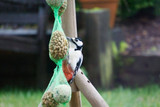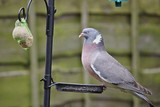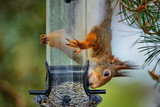Bird Feed To Help You Spot Wild Birds In Winter
One of the simplest pleasures in life is spotting wild birds in our gardens and local area and this is something we can all enjoy year-round. If you’re looking for bird feed to help you spot wild birds in winter, we have some suggestions to get you started.
Why is bird feed so important for wild birds in winter?
Colder temperatures and harsher weather conditions during the long winter months make life harder for birds. Even birds that have adapted to survive the cold UK winters can benefit from additional bird feed during winter, as their natural food sources will be in shorter supply, particularly in snowy or icy conditions.
Birds require a wide range of nutrients to survive all year round but particularly in bad weather when flying conditions are poor and birds will use more energy in their search for food, water and shelter. Extra bird feed can give wild birds the additional energy they need to make these difficult journeys.
The ‘Hungry Gap’ refers to a period of winter where seed-bearing crops are in short supply in the UK. The British Trust for Ornithology (BTO) found some birds may be at risk of disappearing from the British countryside because they are struggling to find adequate food between February and April as most of the seed-bearing crop fields are ploughed at this time.
All wild birds also need fat in their diet so that they can store it to keep warm during winter, however not all fats are suitable for birds, so it’s important to choose the right type of bird feed if you want to help wild birds in winter.
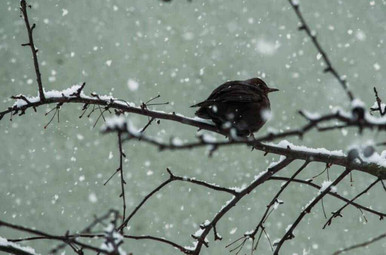
Which bird feed should I choose?
We have lots of bird feed options and many contain a balance of nutrients that are suitable for year-round use. Our wild bird feed mixes use a blend of the highest quality ingredients and are the result of over 20 years of research into bird feed. This means that no matter which of the Kennedy wild bird seed mixes you choose, they can be used to support wild birds throughout the year. Our superior high energy mixture is a great starter for the winter months.
We even have options for attracting specific birds to your garden, such as our Robin Bird Food, designed especially for Britain’s most popular bird and a symbol of winter.
Here are some other excellent choices of bird feed to help you spot wild birds in winter.
Superior Economy Wild Bird Seed
Our superior economy wild bird seed contains Black Sunflower Seeds which are full of essential nutrients and have a high oil content to help build healthy fat reserves and Sunflower Hearts which are highly nutritious and easy for fast feasting, making them ideal bird feed for winter. This bird feed is versatile to attract a wide variety of birds and is perfect for feeding all year round. You can use it in a seed feeder or scatter it on a bird table.
High Energy Bird Feed Premium Quality
Our high energy bird feed is blended with the highest quality seed, perfect for all small garden and farmland birds. It can be used all year round but has been specially designed to bridge the ‘hungry gap’ when food is scarce and its high energy content makes it perfect for even the coldest winter weather. This bird feed is best fed from a feeder or bird table and can also be scattered on the ground.
Suet Pellets Bird Feed Mixed Flavours
Our suet pellets bird feed is a great way to provide wild birds with high energy food. It contains a mixture of Insect Pellets, Berry Flavour Pellets and Mealworm Suet Pellets. This bird feed is designed to give wild birds a boost and help them survive in harsh weather. It can be dispensed from a suet pellet feeder all year round.
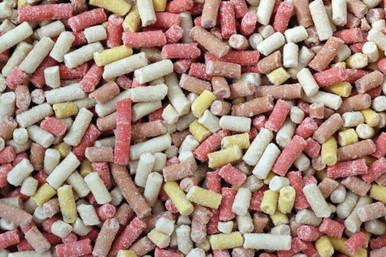
What wild birds might I spot in winter?
Once you’ve chosen your bird feed to help you spot wild birds in winter, what birds can you expect to see in your garden?
In winter, even the shyest of wild birds will be tempted to leave the safety and shelter of their usual woodlands and hedgerows to search for food in our gardens and near our homes, making them easier to spot.
Resident Starlings visit gardens year-round and you may spot even more of these sociable birds during the winter months as some migrate here from Europe for winter, arriving in autumn and staying until February or March.
The Blue Tit is a colourful garden visitor. These delicate little birds enjoy mixed bird feed, fat balls and sunflower hearts. They can be spotted in woodlands, hedges, parks and gardens across the UK.
Goldfinches have a distinctive red face and though some fly south for winter, others remain in the UK year-round. These birds are seed specialists and are particularly attracted to niger seeds.
Perhaps one of the cutest wild birds to spot in winter, Long-tailed Tits are small and fluffy. They visit bird feeders in winter when their usual choice of insects and invertebrates are in short supply. They don’t stay still for long but travel in flocks, making them easier to spot flitting from branch to branch.
You are also likely to spot common garden birds such as Wood Pigeons and House Sparrows.
Unusual birds you may be lucky enough to spot in winter include Waxwings. They don’t breed in the UK but visit during winter. These garden birds have colourful tails, and they particularly enjoy berries and are most often spotted along the East Coast.
Britain’s smallest birds, Goldcrests are naturally shy, spending most of their time in conifer forests but these tiny green and yellow birds can be found at bird tables during winter. They’re resident in the UK all year round and can be spotted across the country.
You may also be lucky enough to spot Bramblings, who typically flock in small groups. They visit the UK during winter and love mealworms. You can spot them by their distinctive orange plumage and screech-like call.
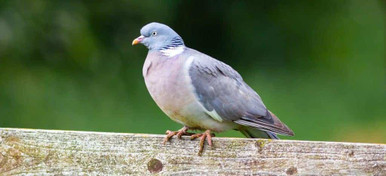
Top tips for spotting wild birds in winter
If you’re using bird feed to help you spot wild birds in winter, make sure you keep feeding the birds throughout the winter, otherwise, they will waste precious energy returning to your bird table or feeder only to find it empty. It’s also important to supply fresh water for bathing and drinking, even when it’s snowy or rainy and to defrost frozen water if it ices over.
Got a question for us? Call us today on 01778 342 665
Explore Popular Articles
-
8 Easy Ways to Attract Woodpeckers to Your Garden
8th Apr 2024Woodpeckers are among the most interesting birds known for their drumming sound and bright colours.
-
How to Protect Your Bird Feeders from Pigeons ?
28th Mar 2024You must have noticed damaged feeding ports, hanging mechanisms, perches, lids and bottoms. Who coul
-
5 Foolproof Ways to Rat-Proof Your Bird Feeder
18th Mar 2024Building a bird-friendly environment is a delightful endeavour, but it involves the responsibility o


